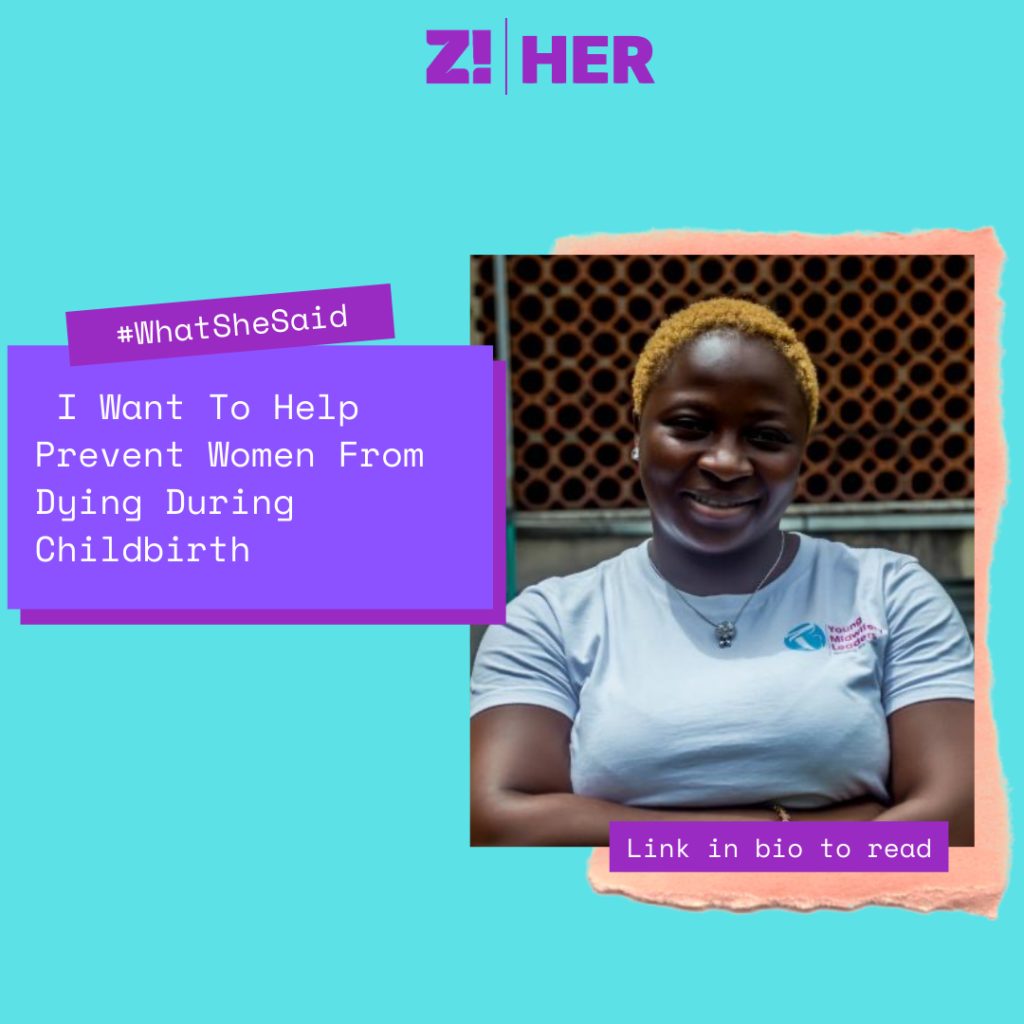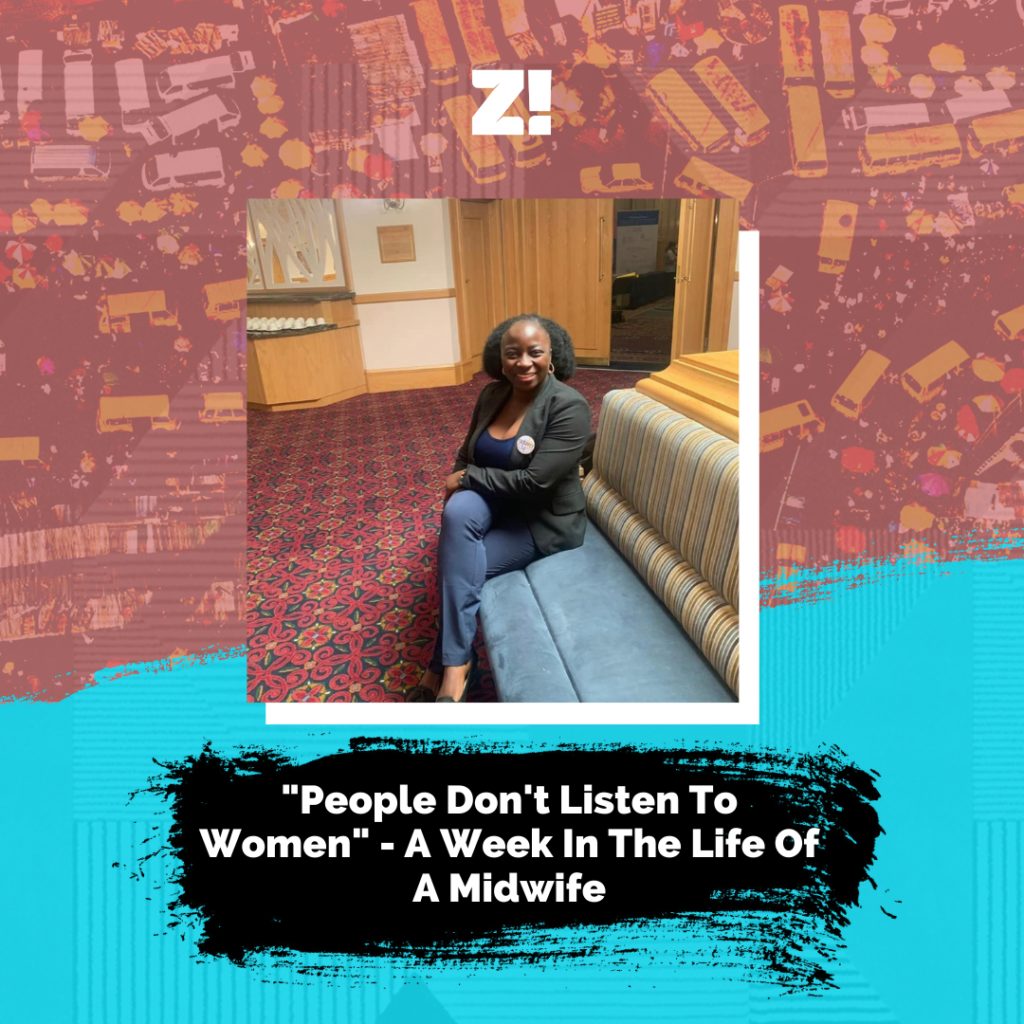The subject of this week’s What She Said is Olajumoke Adebayo, a 26-year-old midwife. She talks about her passion for midwifery, helping pregnant women access better health care and why midwifery is so critical to childbirth.

What did you want to be growing up?
I wanted to become a civil engineer. I had a friend who also wanted to be an engineer. Her dad had an engineering firm. I remember telling my mum that I would work with my friend’s dad after I graduated. She laughed and asked me who told me he would give me a job. I decided to study something else instead.
Oh?
In secondary school, I chose science class — I decided to study medicine. However, the first year I wrote JAMB, I didn’t get in. I considered starting a business, but I tried JAMB again the next year and passed, getting in for nursing instead of medicine. I started university in 2011, but I wasn’t okay with nursing. I went through the four years barely caring about the course.
In my fourth year, I heard about midwifery. I had a lecturer, Dr Flo Folami, who made it sound interesting. She told us she was a lactation consultant. I remember thinking, is this even a job? During lectures, she told us several women die during childbirth, and I was shocked. I always thought childbirth was easy. I told her I wanted to teach people about it so women could stop dying during childbirth, but I didn’t have a midwife license. She said it was okay to do it regardless. That’s how I started a WordPress blog where I wrote articles about pregnancy. This was early 2014. I hid my identity because I felt if people knew I had never been pregnant and didn’t have a license, they would not take my advice. I kept writing though.
How did this lead to midwifery?
From writing, I started doing community projects. I worked with the Nigerian Child Initiative to sensitise Lagos slum communities on tetanus, water, sanitation and hygiene and pneumonia. I became a Carrington youth fellow and implemented a maternal and child health project at Ebute Ilaje community with my team. I also organised a quarterly meetup for young people to talk about sexual health issues, which was one of my favourite projects.
At school, I was excited whenever we were assigned midwifery postings. I remember the first mum I catered to. It was in 2017 — I was trying to get my license at the time. One of the requirements was to take care of a woman from the beginning of pregnancy till the end. I doted on her. I would reassure her whenever she expressed her fears about losing the baby — she had lost her first pregnancy. When it was time for her birth, we went to the family health centre. She had a lot of complications, and eventually, she lost the baby. I was so sad that day. I remember a car almost hit me on my way home. I couldn’t believe she lost it. I started avoiding her because I couldn’t talk to her — I felt like I gave her too much hope.
After a while, I was able to talk to her again. I understood why she had lost both pregnancies, so I advised her to avoid a vaginal birth for her next pregnancy and instead opt for a caesarean section. Today, she has a baby boy. This inspired me to do more.
What happened next?
I graduated in 2018. After school, I worked with a maternal health care start-up as a programmes officer. We trained mothers to teach the women in their community about pregnancy health. It was an exciting programme but I left.
Why?
I was more interested in reproductive health, so I worked with other brands to help young people learn about sexual health. We would go to secondary schools to teach students, and it was fulfilling. By that time, I already had my license. In my NYSC year, I volunteered for an organisation that catered to pregnant women. There, I found out there was a shortage of midwives in Nigeria, so I decided to do something about it.
In October 2018, I started my organisation called Reprolife, which aims to improve the lives of young people by giving them access to sexual and reproductive health information. In 2019, I joined the International Confederation of Midwives. By this time, I had fully decided that my heart belonged to midwifery.
I started using my organisation to do outreaches to women in disadvantaged communities. I organised HIV tests, Hepatitis B tests and other necessary tests for these women. I learnt about preeclampsia in pregnancy, and how it could kill women. I became more intentional about creating lasting relationships with women so they always have access to me. Plus I am also a feminist, so I try to remind women that they have autonomy over their bodies.
I also realised that the midwifery we practice in Nigeria is more of obstetric care. At the end of the day, a lot of women go to traditional birth attendants who don’t know the requirements for a healthy birth. My theory is if we practised midwifery better in Nigeria, more women will come to us instead of traditional birth attendants. My goal is to get better at my job as a midwife.
Sounds like you really enjoy your job. What’s a day as a midwife like?
I go to work every day to see the pregnant women in my care. I teach them antenatal care. Sometimes, the job includes alleviating clients’ worries and telling them about their rights. I also talk to women about family planning. One time, a young girl walked into the hospital, she looked scared. We spoke and she said she wanted to do family planning, but I knew there was more. After we took a test, it turned out she was pregnant. I get cases like that often. Sometimes it’s married women who don’t want any more kids but their husbands don’t understand. Another thing I have noticed is that husbands and mothers-in-law are a huge barrier to pregnant women’s access to health care.
I particularly love community outreaches because the women do not miss the meetings. Whenever they do, they tell you what’s going on with them. It made me realise that they don’t go to hospitals in town because of the distance and cost it takes to get there. They use their traditional birth attendants because it is easier to access. For us, it’s even difficult to get there because the roads are bad and regular transportation doesn’t go there.
This is a lot. What keeps you going?
I think my purpose in life is to help women and make their lives easier. When women come to me and I can provide solutions to their problems, I am overjoyed. Like with the first woman I ever catered to — it meant so much to me that she listened to my recommendation and had a baby. That’s what keeps me going.
I’m curious. Do you want to have kids?
My job makes me more conscious of how I want my birthing process to look like. I know where I want it and what sound I want to listen to while I give birth. I feel more prepared than ever to handle it. Giving birth is not a walk in the park — whether cesarean section or vaginal birth. I’ve told myself that if I can’t handle the pain on my own, I’ll get an epidural. I’ll decide with my partner, and I expect them to support me, so I guess I am looking forward to it.
What’s your least favourite thing about being a midwife?
First of all, I don’t understand why there’s a pushback on midwifery in Nigeria. This is why I bring feminism to it. Studies show that midwives are crucial to successful births, but there’s no support — we aren’t even paid properly. Private hospitals don’t even let us practice midwifery, so the best options for us are primary healthcare centres and state hospitals.
What are your plans for the future?
I know I want to stick with midwifery. I would like to get a masters degree in midwifery or global health because I want to be able to influence policy making. I want to change how midwifery works in Nigeria, from the council to the government. Nigeria had a midwifery programme that was effective in reducing maternal and child deaths in rural areas. The program deployed midwives to rural areas, but it eventually died like everything else in this country. It was so good that it got into a list of the top 10 midwifery programmes in the world. I want to be able to influence how such decisions are made.
ICM, WHO and UNFPA recently launched the State of the World’s Midwifery 2021 report which highlights the life-saving, life-promoting impact of midwives in Nigeria and around the world. Learn more here
For more stories like this, check out our #WhatSheSaid and for more women like content, click here

Subscribe to our newsletter here.



